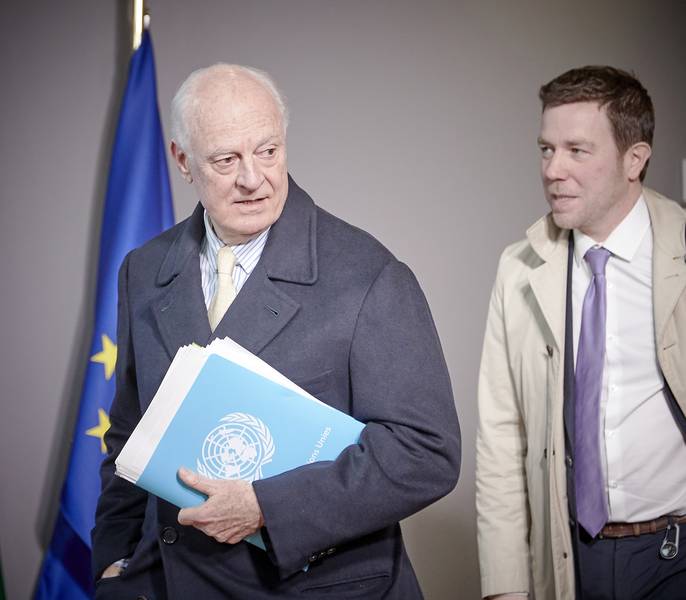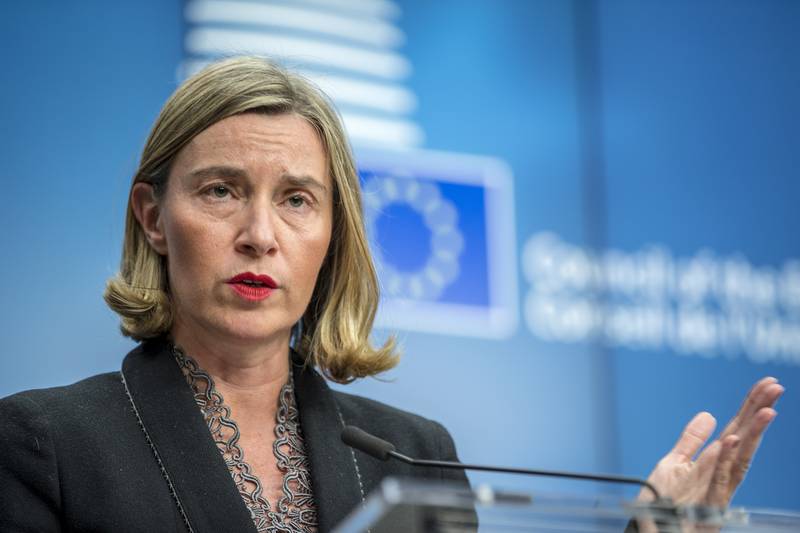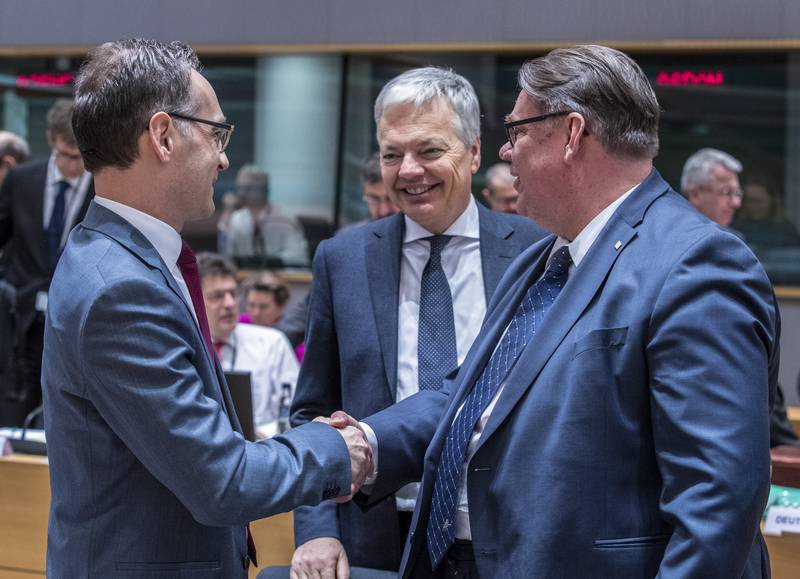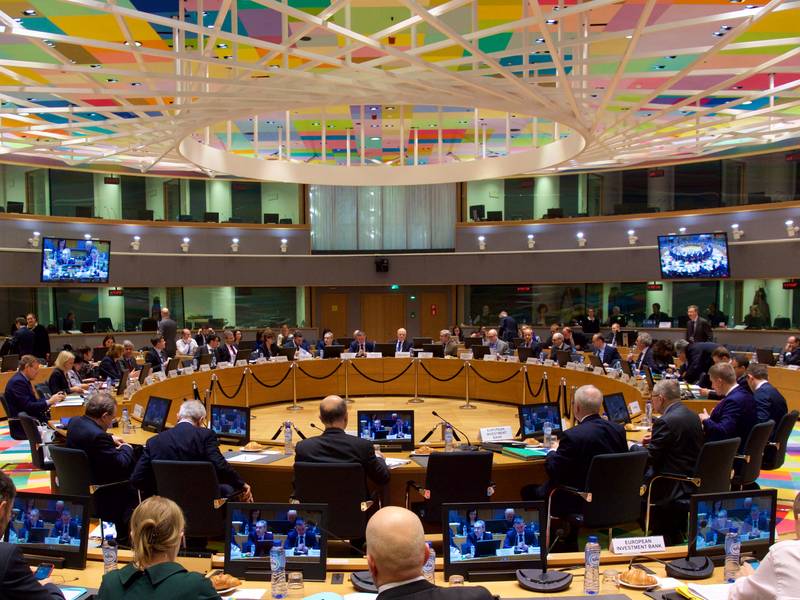EU Is Among the Few Voices of Reason in the World
Adelina Marini, April 3, 2018
 During the spring European Council in March, something very interesting happened, which passed somewhat unnoticed against the backdrop of the packed agenda of the two-day summit. Several participants in the summit mentioned Turkey, Russia and the US in one sentence in the context of threats the EU is faced with. "We have just concluded a very intensive and productive summit, where we addressed a number of specific global economic and political risks, including those related to the actions of Presidents Trump, Putin, Erdoğan, and Brexit negotiations". With these words, European Council President Donald Tusk (Poland, EPP) began the final press conference after the meeting on 22-23 March in Brussels.
During the spring European Council in March, something very interesting happened, which passed somewhat unnoticed against the backdrop of the packed agenda of the two-day summit. Several participants in the summit mentioned Turkey, Russia and the US in one sentence in the context of threats the EU is faced with. "We have just concluded a very intensive and productive summit, where we addressed a number of specific global economic and political risks, including those related to the actions of Presidents Trump, Putin, Erdoğan, and Brexit negotiations". With these words, European Council President Donald Tusk (Poland, EPP) began the final press conference after the meeting on 22-23 March in Brussels.
"We're all, the 28 of us, small countries in many ways but there are big countries that surround us, and we sometimes come to conflict with them - Russia on security, issues with Turkey at the moment as well, issues with America on trade", said Leo Varadkar, Ireland's prime minister, before leaving Brussels. This shows that, currently, the EU is surrounded by foes and allies that can no longer be relied upon. The increasing number of responsibilities of the EU as a global player can also be seen in the packed agendas of the meetings of the EU foreign ministers. The last Foreign Affairs Council took place on 19 March and lasted 8 hours. In the words of EU High Representative for foreign and security policy Federica Mogherini (Italy, S&D), the meeting was very long and tense.
And rightly so because the agenda of the meeting contained many tough and geopolitically charged issues like the nerve agent attack in Salisbury, the deteriorating situation in Syria, Iran's nuclear programme and its role in the conflicts in the Middle East, Ukraine.
The conflict of conflicts
Just days after the sad anniversary since the beginning of the war in Syria 7 years ago, the foreign ministers spent hours discussing the situation in the country with UN Secretary General's Special Envoy Staffan de Mistura. This is the largest humanitarian disaster in the world, which has no parallel in recent history. Currently, 13 million Syrians need humanitarian assistance. Five million fled the country. The European Union is the largest donor of humanitarian aid for Syria and the region - 9.4 bn euros have been allocated by the EU and the member states since the beginning of the conflict. The Union foreign ministers' biggest concern is about the humanitarian situation in Afrin and Eastern Ghouta. The ministers called on all involved in the conflict to immediately implement resolution 2401.
"Sometimes I feel that we and the United Nations are the only ones left in the world insisting for a political solution to the conflict", admitted Ms Mogherini after the end of the 19 March meeting. "But we will never give up on that. We will never give up to the idea that there is a military solution on the ground that dictates the setup of Syria that would not stand on its own feet the day after", the high representative added. Before the Foreign Affairs Council she was subjected to heavy criticism in the European Parliament during a debate on Syria on March 13. "We can no longer talk about a civil war in  Syria. This is a massacre. Putin, in great form, is playing his favourite game of a para maniac - giving support to the Assad regime and proposing a truce", said Romanian MEP Cristian Dan Preda (EPP).
Syria. This is a massacre. Putin, in great form, is playing his favourite game of a para maniac - giving support to the Assad regime and proposing a truce", said Romanian MEP Cristian Dan Preda (EPP).
"All our efforts to implement a ceasefire in eastern Ghouta are failing one after another", added another Romanian MEP, Victor Bostinaru (S&D). "High Representative Mogherini and colleagues, are you not also getting sick of this debate again and again and again? The toxic, cynical and bloody cycle that is the war in Syria must stop. It is not too late for us in the EU to play a more effective and meaningful role towards peace, justice and accountability for Syrians", said Marietje Schaake (ALDE, The Netherlands). There were also direct appeals to move forward to military action because diplomacy had failed. Many MEPs, mainly from Greece and Cyprus, pointed at Turkey. "Your friend Turkey has invaded Syria. Europe doesn't have any courage to act and thus supports", said Eleftherios Synadinos, non-attached MEP, member of the Greek nationalist party Golden Dawn.
Elena Valenciano (S&D, Portugal) called on the EU to exercise more pressure on Turkey. "Turkey is playing a double game here", she believes. "The dismissal today of one of the most sensible voices in the US administration by President Trump – that is US Secretary of State, Rex Tillerson – is also of grave concern for what’s going on in the world", was the opinion of Charles Tannock (ECR, UK). "I'm ashamed that we are once again talking about Syria. Mr Putin doesn't listen to us, Mr Assad doesn't listen to us, Mr Trump doesn't listen to us, Mr Erdogan doesn't listen to us", Takis Hadjigeorgiou (GUE-NGL, Cyprus) summarised the situation. "[R]ecent events in Syria have shown just how drastic a rethink Western policy needs. We have reached a point where a supposed cornerstone ally, Turkey, is conducting military operations against fellow allies in the fight against both ISIS and the Assad regime", said Raymond Finch (EFDD, UK).
Sofia Sakorafa (GUE-NGL, Greece) called for sanctions to be imposed on Turkey. The MEP sharply criticised EU member states for not implementing their common decision to ban the selling of European arms. "Where do they sell the guns, Mrs Mogherini?", she asked. Her Portuguese colleague, Ana Gomes (S&D), also raised the issue of arms. "The EU needs to fight the fact that weapons are being illegally sent to terrorists in Syria and we've also had reports that 95% of the weapons used by ISIS and other terrorist groups are produced in Eastern Europe. They come from countries such as Bulgaria, and then they are resold violating treaties on the trade in weapons, and European standards as well", she said.
Against Turkey burst out Slovakian MEP Branislav Skripek from the group of European Conservatives and Reformists. "When will we understand that Turkey is indeed carrying out a jihad with the goal of ethnic cleansing and genocide? Turkey has said so itself. We cannot continue to ignore these facts. We have to understand that the goal of Turkey is to expand its borders and wipe out the people of northern Syria and Iraq. Turkey threatened this week to invade Iraq. We have to draw the conclusion that we cannot continue with Turkey as we did. If we continue with Turkey the same way, we will have no argument left to judge anyone else based on human rights issues", the MEP emphasised.
The debate, which lasted for an hour and a half, brought a strong emotional reaction out of the high representative. "I have not heard different proposals on what we should do in a different manner", she said and recalled that the EU continues to be number one in humanitarian aid. "We are the ones gathering the international community, keeping, as some of you said, Syria on top of the international agenda. It's not many others doing that this moment, and continuing to work with the UN to unite the international community in trying to sustain intra-Syrian talks. We are the only ones supporting the united Syrian opposition in Brussels, in Geneva, everywhere, supporting concretely their preparations for entering the negotiations in Geneva".
 Mogherini also said that the EU is the only one to speak with everyone and does not have a hidden agenda. "Are we doing enough? We're doing what we can. Are we producing results? Not the results we would like to see. I think we're doing the right things, the things that are in our capacity to do and I think they are many. If you think the EU role is limited, no, it's a huge role", the high representative continued. She admitted that the EU has been given a great responsibility. Later, after the Council meeting, she reminded that everyone who thought a military victory were possible on the ground it will cost dearly and will be dangerous.
Mogherini also said that the EU is the only one to speak with everyone and does not have a hidden agenda. "Are we doing enough? We're doing what we can. Are we producing results? Not the results we would like to see. I think we're doing the right things, the things that are in our capacity to do and I think they are many. If you think the EU role is limited, no, it's a huge role", the high representative continued. She admitted that the EU has been given a great responsibility. Later, after the Council meeting, she reminded that everyone who thought a military victory were possible on the ground it will cost dearly and will be dangerous.
Last year, on April 3rd, the Council adopted a strategy on Syria, which includes stopping the war through a political transition, saving lives and addressing the humanitarian needs of the most vulnerable Syrians, promoting democracy, human rights and freedom of speech, seeking accountability for war crimes, support for reconstruction. On 24 and 25 April, in Brussels, the second conference on Syria will take place which will be chaired by the EU and the UN. The main objective is to mobilise humanitarian aid for the Syrians within and outside the country. The conference also aims to gather political support for a UN-led peace process.
At the first conference last year, commitments were made for humanitarian aid worth 5.6 billion euros for 2017, and 3.47 bn euros for the 2018-2020 period. At their meeting on 19 March, the Council added four more persons to its sanctions list of the Syrian regime. Those are a high-ranking military official and three scientists involved in distribution of chemical weapons. With them, the number of persons with travel bans and asset freezes rose to 259. The EU imposed on Syria an oil embargo, restrictions for certain type of investments, freezing of assets of the Syrian central bank in the EU, restrictions for export of equipment and technology that can be used for internal repressions, equipment and technology for surveillance and interception of the internet or telecommunications.
With Iran the EU is trying to keep the cake and eat it
The Union has charged itself with the difficult task to view the problems with Iran separately. On the one hand, the Foreign Affairs Council says that it is very important to keep the nuclear deal with Iran as it ensures security of the region and beyond. In the same time, however, they urge the deal to be viewed separately from the dialogue the EU has with Iran regarding its involvement in regional conflicts. Federica Mogherini said that the bigger part of her conversations with Iranian Foreign Minister Mohammad Javad Zarif are about Syria. "And obviously, there are issues, like Syria or Yemen, on which  we have very critical positions on Iran moves, but we are determined to address them outside of the scope of the nuclear agreement", Ms Mogherini explained.
we have very critical positions on Iran moves, but we are determined to address them outside of the scope of the nuclear agreement", Ms Mogherini explained.
A double approach to Ukraine too
A day after another bitter anniversary - the annexation of the Crimea - the Foreign Affairs Council discussed relations with the Ukraine. The ministers confirmed their policy of non-recognition and their full support for the implementation of the Minsk agreements. They express concern with the humanitarian problems in the eastern part of the country. In the same time, however, the EU insists Ukraine to focus on reforms. The ministers register progress in economic reforms but underscore that it is necessary to invest more efforts in the judiciary reform and the fight against corruption. On 27 June, in Copenhagen, there will be a conference on reforms in Ukraine.